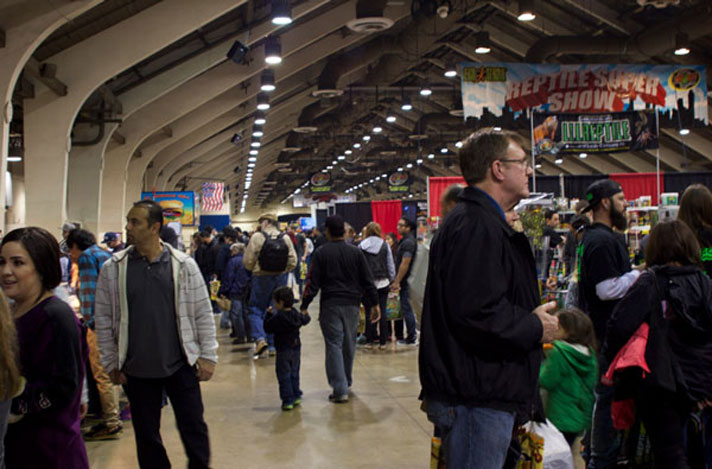The herp industry wants its constituents to be successful raising and breeding the animals they acquire in order to grow the hobby.
Question: Wouldn’t it be wise for all the reptile shows to offer educational lectures in addition to a marketplaces for reptiles? Every year here in Chicagoland, the Chicago Herpetological Society has a show that’s just for education, and it’s great! I think many parents would view regular reptile shows more kindly if they could bring their children to them and know they’d also learn about reptiles as more than pets to be kept in cages.
Shannon Deland, Wheaton, Ill.

Photo by John Virata
Some reptile shows have lectures to help educate attendees.
Answer: I agree with you 100 percent, and frequently participate in educational lectures at shows where I vend. In fact, most of the shows I attend offer talks by experts speaking on their special herpetological fields of interest. It’s standard practice at the majority of shows with which I’m familiar, and show promoters have been arranging such talks for as far back as I remember, in order to offer more than simply the sale of new pets. The herp industry wants its constituents to be successful raising and breeding the animals they acquire in order to grow the hobby. Of course, this runs against the goals of its enemies, who lobby to destroy it with misinformation and trickery.
There will always be a vocal minority who oppose any public display of herps in a commercialistic way. Those kinds of people live in pampered little worlds and believe every distorted bit of news they hear from groups who are bent on ending the herp hobby completely. Those in that humaniac fringe must be aware of the progress captive breeding has made over the past few decades by now, but they never mention this because it would negate their rhetoric about all the wild animals that they say are being collected for the pet trade by suggesting the alternative source that captive breeding provides today, and has been for many years.
It’s important to the Humane Society of the United States (HSUS), People for the Ethical Treatment of Animals (PETA) and their ilk to keep their supporters in the dark, and believing nearly all pet herps are still collected from the wild only to go on to suffer shortened lives in agony while at the same time nature is being depleted. This way, gullible supporters will continue to send donations to these groups thinking they’re helping combat the “slaughter.” Countering such groups’ cleverly designed advertising is a secondary reason most show promoters line up speakers during their events.
I believe ReptileFest, which the Chicago Herpetological Society puts on every spring, is the finest example of an event that is aimed at educating the public. It’s primarily a teaching affair; no sales of live animals occur during ReptileFest, although supplies are available for sale. The emphasis is on providing an exchange of information where attendees are given the opportunity to ask questions, as well as to see and hold live herps for two days. The 2018 ReptileFest will be held April 14 and 15; visit chicagoherp.wixsite.com/reptilefest for information.
Bill Love photographs herps in nature, writes and lectures. He assists his wife, Kathy, with her business, CornUtopia, and via his company, Blue Chameleon Ventures, lectures to herp groups and photographs private collections.


